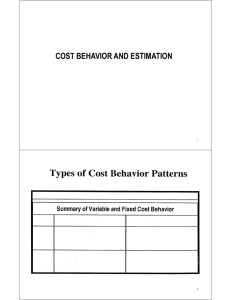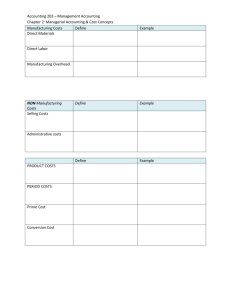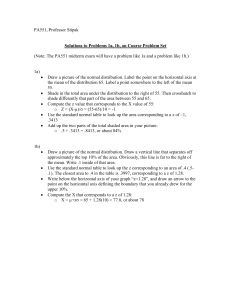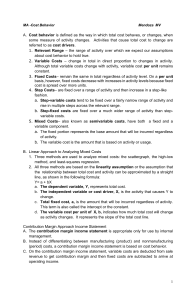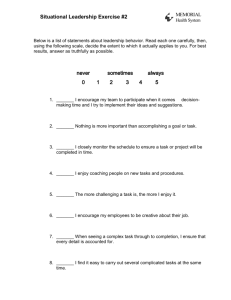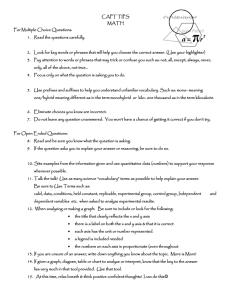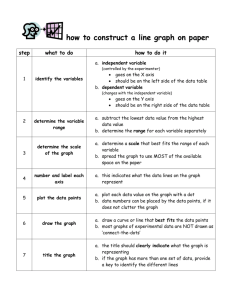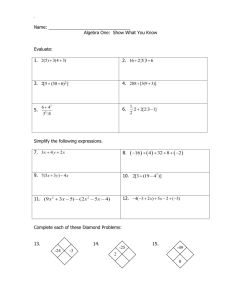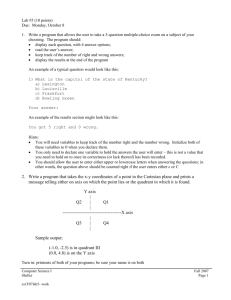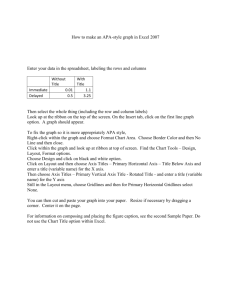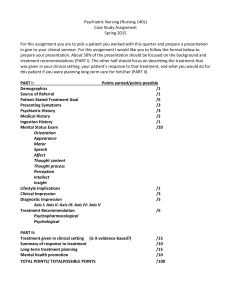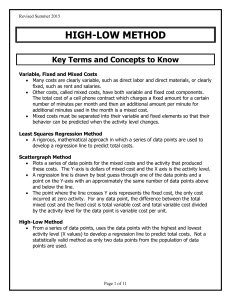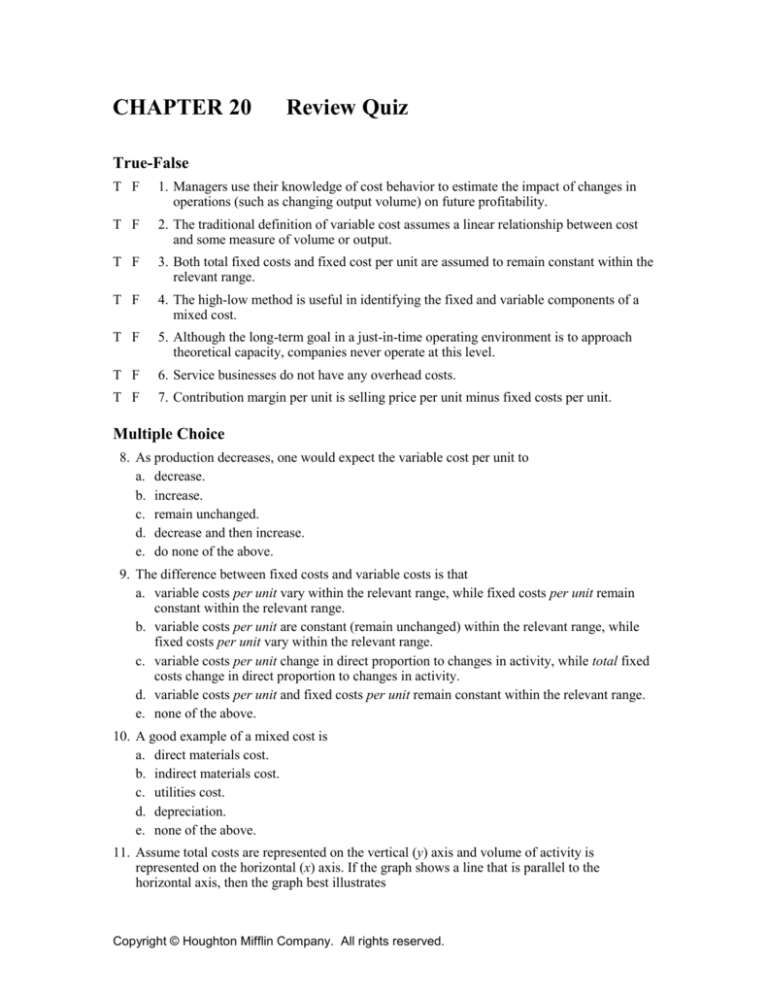
CHAPTER 20
Review Quiz
True-False
T F
1. Managers use their knowledge of cost behavior to estimate the impact of changes in
operations (such as changing output volume) on future profitability.
T F
2. The traditional definition of variable cost assumes a linear relationship between cost
and some measure of volume or output.
T F
3. Both total fixed costs and fixed cost per unit are assumed to remain constant within the
relevant range.
T F
4. The high-low method is useful in identifying the fixed and variable components of a
mixed cost.
T F
5. Although the long-term goal in a just-in-time operating environment is to approach
theoretical capacity, companies never operate at this level.
T F
6. Service businesses do not have any overhead costs.
T F
7. Contribution margin per unit is selling price per unit minus fixed costs per unit.
Multiple Choice
8. As production decreases, one would expect the variable cost per unit to
a. decrease.
b. increase.
c. remain unchanged.
d. decrease and then increase.
e. do none of the above.
9. The difference between fixed costs and variable costs is that
a. variable costs per unit vary within the relevant range, while fixed costs per unit remain
constant within the relevant range.
b. variable costs per unit are constant (remain unchanged) within the relevant range, while
fixed costs per unit vary within the relevant range.
c. variable costs per unit change in direct proportion to changes in activity, while total fixed
costs change in direct proportion to changes in activity.
d. variable costs per unit and fixed costs per unit remain constant within the relevant range.
e. none of the above.
10. A good example of a mixed cost is
a. direct materials cost.
b. indirect materials cost.
c. utilities cost.
d. depreciation.
e. none of the above.
11. Assume total costs are represented on the vertical (y) axis and volume of activity is
represented on the horizontal (x) axis. If the graph shows a line that is parallel to the
horizontal axis, then the graph best illustrates
Copyright © Houghton Mifflin Company. All rights reserved.
a.
b.
c.
d.
e.
fixed costs per unit.
total direct materials cost.
equipment maintenance cost.
factory supervisory salaries.
none of the above.
12. Data for Cost A and Cost B are as follows:
Number of Units
Produced
Cost A
1
10
100
Total
Cost
$
10
100
1,000
Number of Units
Produced
Per Unit
Cost
1
10
100
$3,000
300
30
Cost B
Which of the following best describes the behavior of Costs A and B?
a. Cost A is fixed; Cost B is variable.
b. Cost A is variable; Cost B is fixed.
c. Both Cost A and Cost B are variable.
d. Both Cost A and Cost B are fixed.
e. None of the above
13. In the month of lowest production volume, 500 units were produced, and total utilities costs
were $2,800. In the month of highest production volume, 850 units were produced, and total
utilities costs were $4,200. Using the high-low method, what is the fixed cost?
a. $400.00
b. $800.00
c. $2,675.00
d. $3,987.50
e. None of the above
14. In the month of highest telephone activity, 3,400 calls were placed, and total telephone costs
were $1,050. In the month of lowest activity, 2,000 calls were placed, and total telephone
costs were $700. Using the high-low method, what is the variable cost per call?
a. $4.00
b. $2.00
c. $.50
d. $.25
e. None of the above
15. The following information represents an annual income statement for a company that
manufactures laser printers:
Sales revenue (1,600 units @ $400)
Less variable costs
Contribution margin
Less fixed costs
Operating loss
$640,000
384,000
$256,000
400,000
($144,000)
What is the breakeven point in units?
a. 1,000
b. 1,960
c. 2,500
d. 2,800
e. None of the above
16. If a product has a selling price of $35 per unit, variable costs of $15 per unit, and total fixed
costs of $240,000 per year, how many units must be sold during the year to generate a profit
of $80,000?
a. 32,000
b. 16,000
c. 14,000
d. 8,000
e. None of the above
17. Z Company manufactures two products, X and Y. The selling price is $12 per unit for X and
$16 per unit for Y. The variable cost is $8 per unit for X and $10 per unit for Y. Fixed costs
total $35,000 per month. Each product is half of Z Company’s sales mix. How many units of
Y must the company sell to break even?
a. 3,500
b. 7,000
c. 8,750
d. 14,000
e. None of the above

